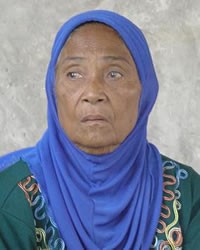Sarudu in Indonesia

Photo Source:
Anonymous
|
Send Joshua Project a map of this people group.
|
| People Name: | Sarudu |
| Country: | Indonesia |
| 10/40 Window: | Yes |
| Population: | 6,300 |
| World Population: | 6,300 |
| Primary Language: | Sarudu |
| Primary Religion: | Islam |
| Christian Adherents: | 0.50 % |
| Evangelicals: | 0.20 % |
| Scripture: | Translation Started |
| Ministry Resources: | No |
| Jesus Film: | No |
| Audio Recordings: | No |
| People Cluster: | Kaili-Tomini of Sulawesi |
| Affinity Bloc: | Malay Peoples |
| Progress Level: |
|
Introduction / History
The Sarudu live in the northern part of the Indonesian province of West Sulawesi (Sulawesi Barat). This province was formally separated from South Sulawesi and became an independent province in 2004. The Sarudu live in the North Mamuju District, and primarily in the Sarudu subdistrict, which is an along the western coast of Sulawesi, just north of the mouth of the Lariang River. Most of the Sarudu live in small towns or villages, and recently a motor road has been built through the area. The area is a flat alluvial plain. Parts of it are swampy, and the weather is always hot and humid.
What Are Their Lives Like?
It is likely that the ancestors of the Sarudu came from the mountains of Central Sulawesi, where the present-day Uma people live, and that they ate rice as their main staple. (The root word in the Sarudu language for "eat" is identical to the word for "cooked rice.") But the main staple of most Sarudu now is sago. Most Sarudu are farmers, planting corn (maize), rice and various vegetable crops. They also cultivate sago palm trees, from which they obtain the edible starch that forms a main part of their diet. They also tend chickens, cows and other livestock, and catch fish in local rivers and streams. Although the Sarudu live not far from the sea, few Sarudu have become seafarers, and few make their living fishing in the sea.
The Sarudu language is very similar to the Uma language, which is in Central Sulawesi. Beginning before World War I, the Salvation Army and other church groups evangelized the Uma, and the New Testament was translated into Uma and published in 1996. But the Sarudu, though they are very similar to the Uma in language and culture, were on the "wrong side of the border" and thus their area was not evangelized. Instead, they became Muslims due to the influence of the large Muslim groups in South Sulawesi, such as the Bugis, Makassar, Mandar and Mamuju.
What Are Their Beliefs?
When the gospel came to the Uma in Central Sulawesi, this also opened the door to other blessings. Over the years the church has built health clinics and schools in Uma villages. The churches also facilitated various programs to improve the life of the Uma, such as programs to vaccinate children, programs to educate the parents of young children in health and nutrition, programs to eradicate tuberculosis, etc. In contrast to their Uma relatives in the mountains, however, the Sarudu live in a poor area. They have little medical care available in their villages, their schools are poor quality, and they have few cash crops.
Although the Sarudu are Muslim, most of them are nominal Muslims. In their everyday life, their traditional animistic beliefs still hold sway. These include beliefs in various spirits that control the forest, streams and other aspects of nature. The Sarudu believe that sickness and other calamities are caused by these spirits. They also believe that some people obtain power from these spirits and can use that power to inflict curses on others. When sickness or other problems strike, the Sarudu often turn for help to a shaman, a person who knows how to deal with these spirits and with curses.
Missionaries report that there are no churches or organizations who have any evangelistic or church-planting work among the Sarudu. Nor are there any Sarudu believers, except perhaps for an individual here or there who has married into an outside Christian family.
What Are Their Needs?
The Sarudu, along with the Topoiyo, Baras, and a few other people groups in Western Sulawesi, are small, neglected groups in a backwater area of Indonesia. Even though they are few, the people in these groups are just as unreached as those in the large, more prestigious groups like the Bugis. Pray some of the well-established churches in other parts of Sulawesi, such as the Uma or the Toraja, will get the vision to do evangelism and church planting among the Sarudu.
Prayer Points
Pray for the Sarudu people to experience and embrace the glory of the Lord.
Pray for Sarudu elders to have dreams and visions of the risen Christ that will open their hearts to the one who is truth.
Pray for Sarudu disciples who will make more disciples, blessing their entire community.
Pray for dedicated and loving workers to go to them.